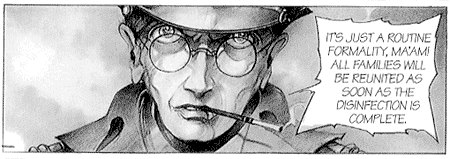 By Pascal Croci
By Pascal Croci
88 pages, black and white
Published by Harry N. Abrams Inc.
Writing about the Nazi concentration camps of World War II is a difficult task. Not because of the lack of facts or material, but because of the emotional weight that they carry. Similarly, it can be difficult to review such a work either on a personal or professional nature. It’s all right to dislike a book on its technical merits while still appreciating the work and emotion that went into its creation. It’s with this in mind that with Auschwitz, I feel that I can say that while Pascal Croci has certainly poured his heart and soul into the book, the end result fails to come together.
Kasik, Cessia, and Ann are a Polish family who, like so many others, find themselves deported to Auschwitz in 1944. There, amidst the death and suffering of the Polish, Jewish, and Czech people that they encounter, they desperately cling to their lives. But will they ever be able to retain their sanity if they do survive?
Knowing that Auschwitz was originally written in French, it’s hard to know if some faults in the narration are due to the translation, or the original source material. Judging solely on what is presented to me in English, though, Croci’s story comes across as disjointed and slightly lacking in details. Upon his characters’s arrival in Auschwitz, the story does not so much flow as it jumps from one event to the next; you never really get a feel for the protagonists of Auschwitz and what—besides a basic instinct to survive—drives them in any real fashion. It’s frustrating because there’s so much story potential here; Croci talks about the research and interviews that he conducted in the appendix of the book, but in some ways that seems to have been his undoing. Croci is so familiar with the story he’s writing around these historical events that it’s as if he doesn’t see the pieces he’s leaving out, because they’re still present in his mental map of the book. Characters appear and vanish at the drop of a hat, and in the end one gets the feeling that it’s like watching a documentary in a language unknown to you. You get the basic ideas, but all the specifics feel elusively out of reach.

Croci’s art in Auschwitz, fortunately, transcends language barriers and succeeds where the narration does not. It sounds strange to describe art that depicts such atrocities as “beautiful” but that’s the best adjective I can come up with to describe it. Ignoring for a moment what the art is portraying, you’ve got lush pencil shadings in Auschwitz, able to portray such a wide range of emotion as Croci’s story demands. His characters are gaunt and desperate, with hollow eyes showing their every thought. Croci’s expressive art makes it hard to read certain scenes because you feel like you’re getting a real glimpse into the concentration camps of 60 years ago, with death and suffering an everyday part of existing there. Kazik and Cessia are depicted so strongly here that when you see the framing device set in 1993 Bosnia, it’s still recognizably the same people, merely 50 years older.
I wanted to like Auschwitz more than I ultimately could. Ironically it’s the appendix at the end with Croci’s thoughts and notes on creating the graphic novel that were the most interesting thing for me, seeing the path that he took in preparing for the book as well as any artistic licenses he took, and why. There are little bits of information in Auschwitz that I’d never heard of before, like the condition of the Czech compound at the camp, which were enlightening and interesting. The presentation of the book itself is also quite nice, with a beautiful oversized hardcover trim and nice slick paper. (Although hopefully in later printings the unfortunate typo on the first page stating the setting to be 1933 Bosnia when it should have been 1993 Bosnia will be corrected, as well as the half a missing sentence in the interview on page 80.) In the end, Auschwitz is a heartfelt but ultimately flawed work. The art is incredible, but the writing just doesn’t live up to the same standards. Hopefully with a less emotional subject Croci’s next work will come together a bit stronger, but for now it’s just not quite there.
Purchase Links:
